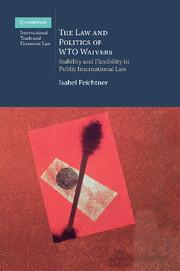Book contents
- Frontmatter
- Contents
- Acknowledgements
- 1 Why study the WTO waiver?
- Part I The stability/flexibility challenge in public international law and particularly the WTO
- Part II The practice and law of waivers
- Part III The potential of waivers to address the stability/flexibility challenge in international law
- 6 The potential of the waiver as a flexibility device
- 7 The politics of the waiver process
- 8 Conclusion
- Bibliography
- Index
- References
6 - The potential of the waiver as a flexibility device
Published online by Cambridge University Press: 05 December 2011
- Frontmatter
- Contents
- Acknowledgements
- 1 Why study the WTO waiver?
- Part I The stability/flexibility challenge in public international law and particularly the WTO
- Part II The practice and law of waivers
- Part III The potential of waivers to address the stability/flexibility challenge in international law
- 6 The potential of the waiver as a flexibility device
- 7 The politics of the waiver process
- 8 Conclusion
- Bibliography
- Index
- References
Summary
International law faces the following dilemma. To effectively pursue its objectives, international law requires autonomy from the domestic political processes of individual states. This autonomy is formally achieved by basing the validity of international treaty law on initial state consent and the principle pacta sunt servanda. Due to the limited validity criteria of international law, validity and legitimacy do not necessarily coincide in international law. While state consent and ratification are the main requirements to create binding treaty law, they are not sufficient to safeguard its legitimacy. The more international law impacts domestic legislatures, administrations and individuals, the more it requires justification, which goes beyond state consent and ratification, to be considered legitimate. Due to the diversity and pluralism of global society, justification based on shared values is no option. While there may be agreement on broadly formulated principles and values, their application and realization in concrete instances is thoroughly disputed. This leads to the quest for a democratic justification of international law. Democratic justification today may, however, only be fully realizable at the level of the national (maybe regional) polity. Two requirements result from this finding. Firstly, in light of its legitimacy deficit international law needs to be devised to take account of domestic values and regulatory preferences, as well as restraints that concern individual states’ capacity to comply with international law. Secondly, international law's legitimacy deficit should be addressed by making international institutions more accountable, transparent and representative, and thus possibly more democratic.
The waiver may contribute to both quests. As individual exception it permits individual members to deviate from the legal rules either to take account of these members’ restrictions in administrative capacity or to allow them to pursue their political choices. As general exception and rule-making instrument it may address legitimacy concerns by limiting one institution's jurisdiction in favour of another's (potentially more legitimate) jurisdiction as well as by adapting legal norms to claims of inadequacy and injustice. At the same time the waiver power takes account of the continuing basic premise of international law's validity, namely the principle of pacta sunt servanda.
- Type
- Chapter
- Information
- The Law and Politics of WTO WaiversStability and Flexibility in Public International Law, pp. 276 - 326Publisher: Cambridge University PressPrint publication year: 2011

